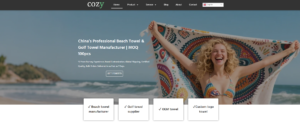
Ever wonder what makes some beach towels fly off the shelves while others just... flop? I’ve been there. And through trial, error, and factory partnerships, I’ve cracked the code.
To create best-selling beach towels, align your design with market trends, choose fabric your customers love, work with a proactive factory, focus on brand storytelling, and treat quality control as non-negotiable. These steps don’t just create a product—they build a beach towel brand that people rave about.
Now let’s break down each of these secrets and make sure you’re not leaving money on the table.
Start with Market-Driven Design
Design without market research is like throwing darts in the dark.
A winning beach towel design begins with understanding your audience—what colors they’re into, what sizes they need, and what patterns make them stop scrolling. Use tools like Pinterest, Etsy, and TikTok to spot design trends early. Validate your ideas with small test runs or pre-orders before diving into bulk production.

Look Where Your Customers Hang Out
When I was designing my first towel collection, I spent hours on Pinterest and Etsy. I wasn’t just scrolling—I was hunting. I looked at what was trending in coastal aesthetics, what people pinned under “dream beach setup,” and what actually sold.
And honestly? That’s where I learned bright, tropical vibes sold better in Florida, while neutral, earthy palettes did better in California.
Validate Before You Scale
Got a killer idea? Don’t go all in yet. Print a small batch. Share mockups on Instagram. Set up a pre-order campaign. The market will tell you what’s working.
| Trend Spotting Tool | How to Use It |
|---|---|
| Search “beach towel aesthetic” to find color and design trends | |
| TikTok | Look for beach setups or unboxing videos for what's visually appealing |
| Etsy Bestsellers | Check what’s selling and which reviews mention “design” |
Choose the Right Fabric for Your Target Market
Choosing towel fabric is more strategic than it sounds—it’s emotional.
Terry, velour, microfiber… Each fabric speaks to a different customer. High-end buyers love thick cotton terry. Active travelers might prefer quick-dry microfiber. Choose what fits your niche, not just your budget.

Fabric Isn’t Just Feel—It’s Identity
Once, a buyer from a surf shop asked me, “Got anything that doesn’t stay wet forever?” That’s when I realized microfiber towels weren’t just trendy—they solved a problem.
Meanwhile, my boutique clients wanted plush terry that screamed luxury.
Match Fabric to Lifestyle
- Luxury market? Go with 100% long-staple cotton, high GSM (450–600).
- Travel and fitness niche? Microfiber is lightweight, compact, and dries fast.
- Family-friendly brands? A mid-weight terry/velour combo is soft but practical.
Work with a Proactive Factory Partner
This is the game-changer most people overlook.
A proactive factory doesn’t just take orders—they ask questions, flag issues early, and even help you cut costs or improve quality. You want a partner, not just a printer.

Communication Is Everything
When I first started out, I worked with a factory that only responded with one-word emails. Any hiccup became a crisis. But then I found a supplier who advised me. They told me my label placement might peel after a few washes. We fixed it before it became a customer complaint.
Look for This in a Factory
- Offers design file templates
- Flags production risks proactively
- Open to custom packaging or labeling
- Clear lead times and consistent follow-up
Branding That Sells Itself
A towel is just a towel—until your brand gives it meaning.
Great branding tells a story that connects emotionally. From your logo to your hang tag copy, everything should whisper (or shout) your vibe. Whether you’re surfy and bold or minimal and chic, make sure your towels feel like your brand.

Let the Brand Do the Selling
Ever seen a plain towel sell for $50? I have. And it wasn’t because of the GSM—it was the branding.
One of my clients positioned their towels as “Designed for dreamers who live by the tides.” Every part of the product, from the colors to the packaging, felt aspirational.
Must-Haves for Brand-Driven Products
- Logo label that won’t fade or peel
- Consistent typography and colors
- Branded packaging or belly bands
- A clear vibe: tropical, minimal, boho, sporty?
Quality Control Is Your Best Marketing
Your customers are your final inspectors—don’t let bad product slip through.
Check every batch. A single misprint or color error can lead to returns and bad reviews. Build in quality checks with your factory, and do your own once you receive the shipment.

Learn From My (Expensive) Mistake
Once, I rushed a reorder because a product went viral. I skipped final checks. Half the towels had crooked labels. And returns? Ugh. Lesson learned.
Now, my rule: Every box gets opened and inspected—every time.
| What to Check | Why It Matters |
|---|---|
| Print alignment | Affects perceived quality instantly |
| Stitching strength | Towels tear easily without strong hems |
| Color accuracy | Customers expect what they saw online |
| Label durability | Peeling labels hurt your brand trust |
Conclusion
Creating best-selling beach towels isn’t luck—it’s smart choices, good partners, and paying attention to the little things.






